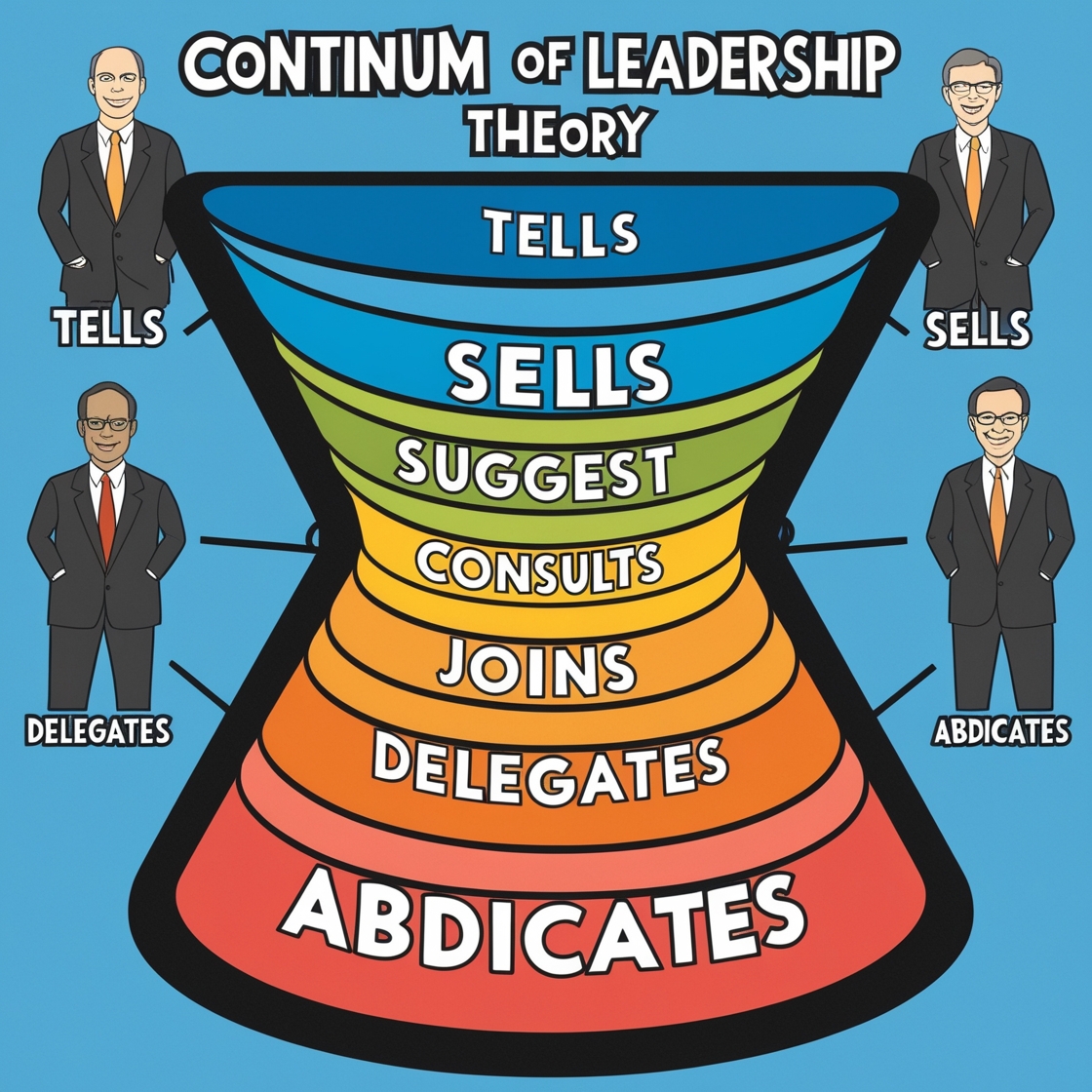The Tannenbaum and Schmidt Continuum Management Theory remains a valuable tool for understanding and applying different leadership styles. The Tannenbaum and Schmidt Continuum Management Theory, developed by Robert Tannenbaum and Warren Schmidt in 1958, is a model that illustrates a range of leadership styles based on the degree of authority exercised by the manager and the level of freedom given to the team. This continuum spans from autocratic to democratic leadership, providing a framework for managers to adapt their style according to the situation and team dynamics.
The Continuum Explained
The continuum is divided into seven distinct styles of leadership, each representing a different balance of managerial control and team autonomy:
- Tells: The manager makes decisions and announces them to the team. This style is highly autocratic, with the manager retaining full control.
- Sells: The manager makes decisions but attempts to persuade the team of their merits. While still autocratic, this style involves some level of explanation and justification.
- Consults: The manager presents ideas and invites input from the team before making a decision. This style begins to incorporate team feedback, though the final decision remains with the manager.
- Joins: The manager presents a tentative decision subject to change based on team input. This style is more democratic, allowing significant team influence.
- Delegates: The manager outlines the problem and sets boundaries within which the team can make decisions. This style grants substantial autonomy to the team.
- Abdicates: The manager allows the team to make decisions independently, providing support only when requested. This style represents the highest level of team autonomy.
Practical Application
The Tannenbaum and Schmidt Continuum is not a one-size-fits-all model. Instead, it encourages managers to assess the context, including the nature of the task, the team's experience, and the organizational environment, to determine the most appropriate leadership style. For instance, in a crisis situation, a more autocratic approach (Tells or Sells) might be necessary to ensure quick decision-making. Conversely, in a creative or highly skilled team, a more democratic approach (Delegates or Abdicates) can foster innovation and ownership.
Benefits and Limitations
Benefits
- Flexibility: The continuum provides a flexible framework that can be adapted to various situations and team dynamics.
- Development: By gradually increasing team autonomy, managers can develop their team's decision-making and problem-solving skills.
- Engagement: More democratic styles can enhance team engagement and motivation by involving them in the decision-making process.
Limitations
- Complexity: Determining the appropriate style requires careful assessment of multiple factors, which can be complex and time-consuming.
- Misapplication: Inappropriate use of a particular style can lead to confusion, reduced efficiency, or decreased team morale.
Key Concepts
-
Tells: This is the most autocratic style where the manager makes decisions unilaterally and informs the team of what needs to be done without seeking their input.
-
Sells: The manager makes the decision but then explains the reasoning behind it to the team, aiming to gain their buy-in and support.
-
Suggests: The manager presents a decision and invites questions and suggestions from the team, allowing for some discussion but ultimately retaining the final decision-making authority.
-
Consults: The manager presents a tentative decision and seeks input and feedback from the team before finalizing the decision. This style involves more collaboration and consideration of team opinions.
-
Joins: The manager presents the problem to the team and collaborates with them to reach a decision. This style is more democratic, with the team having significant influence over the final outcome.
-
Delegates: The manager outlines the problem and sets boundaries within which the team can make decisions. The team has substantial autonomy to decide on the best course of action within those limits.
-
Abdicates: The manager gives full decision-making power to the team, stepping back entirely and allowing the team to take full responsibility for the decisions and outcomes.
-
Autocratic Leadership: A leadership style characterized by individual control over all decisions with little input from team members.
-
Democratic Leadership: A leadership style that involves team members in the decision-making process, promoting participation and collaboration.
-
Managerial Control: The extent to which a manager retains decision-making authority and directs the actions of the team.
-
Team Autonomy: The degree of freedom and independence granted to the team to make decisions and take actions without direct managerial oversight.
